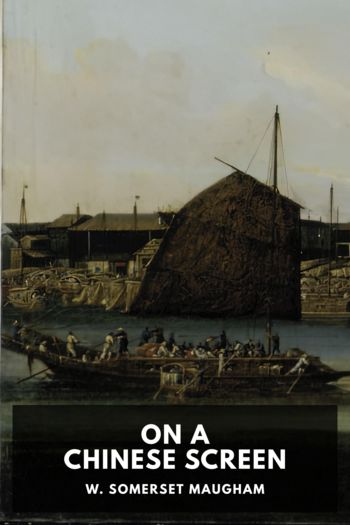Of Human Bondage by W. Somerset Maugham (classic english novels .TXT) 📕

- Author: W. Somerset Maugham
Book online «Of Human Bondage by W. Somerset Maugham (classic english novels .TXT) 📕». Author W. Somerset Maugham
Though it was late he felt too excited to sleep and, going out, made his way into the boulevard and walked towards the light. This led him to the station; and the square in front of it, vivid with arc-lamps, noisy with the yellow trams that seemed to cross it in all directions, made him laugh aloud with joy. There were cafés all round, and by chance, thirsty and eager to get a nearer sight of the crowd, Philip installed himself at a little table outside the Café de Versailles. Every other table was taken, for it was a fine night; and Philip looked curiously at the people, here little family groups, there a knot of men with odd-shaped hats and beards talking loudly and gesticulating; next to him were two men who looked like painters with women who Philip hoped were not their lawful wives; behind him he heard Americans loudly arguing on art. His soul was thrilled. He sat till very late, tired out but too happy to move, and when at last he went to bed he was wide awake; he listened to the manifold noise of Paris.
Next day about teatime he made his way to the Lion de Belfort, and in a new street that led out of the Boulevard Raspail found Mrs. Otter. She was an insignificant woman of thirty, with a provincial air and a deliberately ladylike manner; she introduced him to her mother. He discovered presently that she had been studying in Paris for three years and later that she was separated from her husband. She had in her small drawing-room one or two portraits which she had painted, and to Philip’s inexperience they seemed extremely accomplished.
“I wonder if I shall ever be able to paint as well as that,” he said to her.
“Oh, I expect so,” she replied, not without self-satisfaction. “You can’t expect to do everything all at once, of course.”
She was very kind. She gave him the address of a shop where he could get a portfolio, drawing-paper, and charcoal.
“I shall be going to Amitrano’s about nine tomorrow, and if you’ll be there then I’ll see that you get a good place and all that sort of thing.”
She asked him what he wanted to do, and Philip felt that he should not let her see how vague he was about the whole matter.
“Well, first I want to learn to draw,” he said.
“I’m so glad to hear you say that. People always want to do things in such a hurry. I never touched oils till I’d been here for two years, and look at the result.”
She gave a glance at the portrait of her mother, a sticky piece of painting that hung over the piano.
“And if I were you, I would be very careful about the people you get to know. I wouldn’t mix myself up with any foreigners. I’m very careful myself.”
Philip thanked her for the suggestion, but it seemed to him odd. He did not know that he particularly wanted to be careful.
“We live just as we would if we were in England,” said Mrs. Otter’s mother, who till then had spoken little. “When we came here we brought all our own furniture over.”
Philip looked round the room. It was filled with a massive suite, and at the window were the same sort of white lace curtains which Aunt Louisa put up at the vicarage in summer. The piano was draped in Liberty silk and so was the chimneypiece. Mrs. Otter followed his wandering eye.
“In the evening when we close the shutters one might really feel one was in England.”
“And we have our meals just as if we were at home,” added her mother. “A meat breakfast in the morning and dinner in the middle of the day.”
When he left Mrs. Otter Philip went to buy drawing materials; and next morning at the stroke of nine, trying to seem self-assured, he presented himself at the school. Mrs. Otter was already there, and she came forward with a friendly smile. He had been anxious about the reception he would have as a nouveau, for he had read a good deal of the rough joking to which a newcomer was exposed at some of the studios; but Mrs. Otter had reassured him.
“Oh, there’s nothing like that here,” she said. “You see, about half our students are ladies, and they set a tone to the place.”
The studio was large and bare, with gray walls, on which were pinned the studies that had received prizes. A model was sitting in a chair with a loose wrap thrown over her, and about a dozen men and women were standing about, some talking and others still working on their sketch. It was the first rest of the model.
“You’d better not try anything too difficult at first,” said Mrs. Otter. “Put your easel here. You’ll find that’s the easiest pose.”
Philip placed





Comments (0)